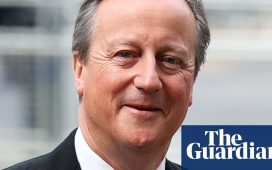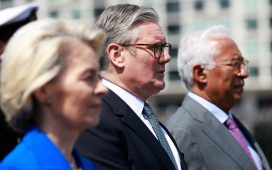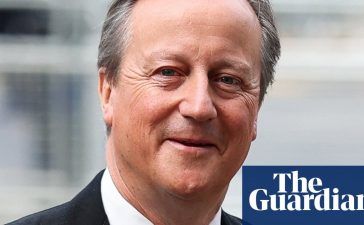Dressed in a crimson velvet cloak, trimmed and lined with white ermine, and flanked by two senior Conservative peers, Lord Cameron of Chipping Norton, the new foreign secretary, will be formally introduced into the House of Lords on Monday amid all the colour and splendour that the second chamber affords.
The former prime minister, who everyone thought had bid a final farewell to Westminster in 2016 after the humiliation of the Brexit referendum, will then deliver his maiden speech the following day in a debate on international trade. It could well go down as the political comeback of the year, if not the decade.
The imagery of the return of an ex-PM who left under such a cloud, and was subsequently embroiled in a major lobbying scandal, may not be perfect for Rishi Sunak, as he attempts his latest leadership reset. But something had to be done. The Tories were in a death spiral. “Suella [Braverman] was mad and taking us down,” said one Conservative MP. “This was what Rishi came up with. It may help, it may not.”
The decision stunned everyone in the Tory party, including good friends of the former occupant of No 10, and those who had served in his governments. “David always had a thing, I thought, about not wanting to be in the Lords. Yes, I was surprised,” said one ally, now in the upper house. “Like Major, Blair, Brown, he didn’t seem to want to do it, having been prime minister.”
Negotiations on the comeback were kept as the tightest of secrets in Downing Street. Only two or three people are said to have known anything, apart from Sunak and Cameron himself.
Former Tory leader William Hague is believed to have been the key interlocutor, and to have convinced Cameron that a stint as foreign secretary (Hague had been in the job under Cameron) would be a good way to restore his reputation at home and abroad and conclude his career on a high note.
So when the news broke, it came as a bolt from the blue. Last Sunday morning the defence secretary, Grant Shapps, who was completely in the dark at the time, was sent out on the TV media round by No 10 and clearly felt he had to put on a partial defence of Braverman in case she survived any reshuffle.
She was facing a barrage of criticism for having inflamed tensions at the pro-Palestinian march the day before, after accusing the police of leftwing bias. The first Shapps would know of the reshuffle next day, in which Braverman was unceremoniously fired and Cameron installed, was when he saw the ex-PM strolling up Downing Street.
Sunak and his team knew it was all a gamble. They were aware that the Tory parliamentary party these days is far more rightwing than it had been in Cameron’s time. The 2019 election result saw many more rightwing pro-Brexit MPs arrive, particularly from “red wall” seats. But among southern and metropolitan voters, Sunak and his allies thought Cameron would play well.
Within hours of the reshuffle, groups of rightwing Tory backbenchers were, however, meeting in the Commons to discuss both setbacks for their wing of the party: the loss of standard-bearer Braverman, and the return of the remainer and social liberal Cameron.
James Cleverly, an affable moderate, had made way at the foreign office and taken Braverman’s place. “Rishi’s Big Throw of the Dice,” said the Daily Mail next day. Sunak was risking a “revolt on the Tory right” the paper added, while noting, more positively, that “in a bold move” Sunak had recalled ex-TV presenter Esther McVey to be “minister for common sense” in charge of “rooting out woke culture”.
By Tuesday, Downing Street minds were turning to the announcement, due the following morning, from the supreme court on the legality of the government’s policy of sending asylum seekers to Rwanda, which had been championed by Braverman and had got bogged down in legal challenges. It was the cornerstone of Sunak’s entire immigration policy. One of the five pledges on which he has staked his reputation is to “stop the boats”.
As No 10 wargamed how to respond to the possible scenarios, depending on how the judgment went, there was also nervousness about what Braverman might do. After her sacking, she had promised to say more in due course.

As it turned out, Braverman decided to go for broke on the afternoon before the supreme court gave its verdict, and in terms that astounded everyone. Even experienced Westminster hands had never seen a resignation letter like it.
On page after blistering page, she tore into the prime minister, accusing him of having “manifestly and repeatedly failed” to honour promises he had supposedly made to her when she agreed to back his leadership campaign last year. Braverman’s support for Sunak had been vital in preventing Boris Johnson from mounting a comeback. “Either your distinctive style of government means you are incapable of doing so or as I must surely conclude now, you never had any intention of keeping your promises,” she wrote.
And in what seemed to be an attempt to pre-empt a negative judgment by the supreme court, she accused Sunak of failing to prepare for that eventuality, and of “magical thinking” about potential future challenges he might mount to keep the Rwanda plan in play.
So extreme was her language and so intemperate, that most Tory MPs thought the letter had damaged her more than Sunak, ending any remote chance she may once have had of becoming leader. “When you write a poison pen letter, you do it in three paragraphs, not three pages,” said one senior backbencher. “It just showed that she was not fit to be home secretary in the first place, let alone leader.”
But – while Braverman was imploding – none of this was playing well for Sunak or the Tories. The latest reset was merely highlighting party divisions, not healing them. The media coverage was all about Conservative party and government turmoil and splits. Labour’s own problems, over Keir Starmer’s refusal to call for a ceasefire between Hamas and Israel, were attracting less coverage than they otherwise would have had, allowing the Labour leader partially off the hook.
It was also escaping no one that Sunak now seemed to be attempting to reset his government every few weeks, whether it was at the party conference, through the king’s speech or by conducting blockbuster reshuffles. And each reset seemed out of sync, in policy terms, with the last one. They did not build on each other, but seemed increasingly contradictory.
In September, at the Tory conference in Manchester, Sunak had become the “change” prime minister, differentiating himself from the Conservative PMs who had gone before him – including Cameron.
To make the point he had dumped the Birmingham to Manchester leg of HS2, a decision Cameron and his chancellor, George Osborne, both condemned in public only a few weeks ago because they had advanced HS2 and believed in it.
As Starmer would put it at prime minister’s questions, “his [Sunak’s] big idea is to keep turning his government on and off at the wall and hoping that we see signs of life”. After 13 years it was not, however, proving easy to find a way forward whichever way Sunak looked: forwards or back, left or right.
Wednesday morning offered a sudden, if brief, ray of hope for Sunak and his team as it emerged that inflation had dropped to 4.6% in the year to October, down from 6.7% the month before. The story led the BBC news for a couple of hours. But then the supreme court delivered its unanimous verdict.
A senior Labour frontbencher could not believe the party’s good fortune. “They [the Tories] had had their best news for months, even years, and then … the Rwanda decision.”
The supreme court ruling was the cue for even worse Tory bloodletting than had come before. The court found that the Rwanda policy was unlawful because migrants faced a real risk of being sent back to their home countries where they could be mistreated. This would be in breach of the European convention on human rights (ECHR), which is enshrined in the Human Rights Act.
Sunak’s entire immigration policy looked in shreds. Rightwing MPs started calling for the UK to reassess its position in the international legal system. Danny Kruger, the MP for Devizes, said the scope of the ruling meant the UK’s involvement in other treaties and conventions had now to be considered. “The government should immediately announce an intention to do what is necessary to insist on our sovereignty. That means legislation to override the effect of the European court, of the European convention on human rights itself and of other conventions including the refugee convention if necessary.”
Speaking after an emergency meeting of the rightwing New Conservatives group of Tory MPs, the party’s deputy chairman, Lee Anderson, said: “It’s a dark day for British people. We should just get the planes in the air right now and send them to Rwanda. People are fed up in this country. They’re fed up of being taken for a ride and paying their taxes to people who have no right to be here and are criminals. The government need to show our leadership and send them back same day.”
Sunak held a press conference in Downing Street and announced he was taking the “extraordinary step” of rushing emergency legislation through to declare that Rwanda was a safe country. There would also be a new treaty with Rwanda as part of legal process to keep the policy alive. There was a sense of desperation spreading across government.
The immigration minister, Robert Jenrick, appeared to stake the survival of Sunak’s government on a strategy that would in effect mean the UK challenging international law. “I don’t see a path to victory at the next general election unless we resolve this issue,” he said.

The legal establishment reacted with barely concealed horror. Bar Council chair Nick Vineall said: “The Bar Council notes with grave concern the prime minister’s suggestion that legislation might be introduced, the purpose of which is apparently to deem Rwanda to be a safe country to which to return asylum seekers.
“If parliament were to pass legislation the effect of which was to reverse a finding of fact made by a court of competent jurisdiction, that would raise profound and important questions about the respective role of the courts and parliament in countries that subscribe to the rule of law.”
In the Commons, Cleverly suggested it would not be necessary to leave the ECHR, while later in his press briefing Sunak signalled that this would have to be an option, despite the huge knock-on effects such a move would have, not least the fact that the ECHR was central to the Good Friday agreement. “If we leave the ECHR the Good Friday agreement goes down the tubes,” said a former cabinet minister.
Immediately, there were indications from senior peers that such emergency legislation would face numerous challenges in the upper house, not least because the Rwanda plan had not been in the 2019 Tory manifesto in the first place.
Lucy Powell, shadow leader of the Commons, asked which bills in the recent king’s speech, which formed the basis of the last but one Sunak reset, would have to be ditched to make way for new Rwanda law. Had King Charles been wasting his time? “The ink is not even dry on the government’s king’s speech yet the prime minister is already proposing a treaty and new laws to mask their utter failure to get a grip on illegal immigration.”
Tory friends of the new foreign secretary in the Lords, meanwhile, raised the question of what the newest recruit to their ranks might think: “All I know is I can’t see him wanting to leave the ECHR. If that were to become policy I think we could have a serious problem.”










